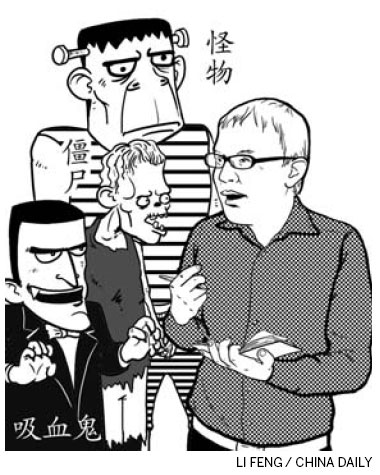Hot Pot Column
A lexicon so descriptive, it can scare you
Updated: 2011-07-27 10:51
By Erik Nilsson (China Daily)

Monsters aren't just scary.
They also reveal a fascinating facet of the Chinese language - that is, the descriptive, rather than terminological, character of its words.
So, the whole casting call of the monster mash bears Mandarin appellations that not only give them names but also explicitly tell you something about them.
This characteristic of Chinese is described with a term that is in itself descriptive - "biao yi ci", which literally translates as, "represent meaning words".
Even the word for "monster" - "guai wu", which literally translates as "weird creatures" - follows this inclination of the Chinese tongue.
Hence, vampires are "xi xue gui", or "suck blood ghosts", in Chinese. The word doesn't just name this variety of ghoul but also tells you something about it - in this case, that this unholy being siphons the sanguineous vital fluid of the human body like a Shop-Vac.
The same holds true for zombies - "jiang shi", which means, "stiff corpse". These living dead are so named in Chinese for their characteristic way of hobbling about with their arms rigidly extended in front of their exanimate-yet-kinetic bodies.
My personal favorite is the Chinese way of referring to the Frankenstein monster. In English, we refer to this mingle-mangle of reanimated human remains by the surname of the mad scientist whose experimentation created the creature. But in Chinese, the monster is called "ke xue gaui ren", or "technology ghost man" - again, a term that tells us something about this fiend.
The interesting thing about the Chinese word for Dr Frankenstein's creation is that it departs from the Chinese linguistic tendency to transliterate proper nouns, such as surnames, in ways that often don't make sense - but can be amusing.
This penchant can be seen in the Chinese name for the world's most celebrated xi xue gui, Dracula.
The Count's name is transliterated in Chinese as "De gu la", which literally means, "virtue ancient pull" - hardly descriptive of the superstar of the bloodsucking set. Another translation replaces the word "virtue" with "German" - even further off the mark and more nonsensical. This xi xue gui put Transylvania, not Bavaria, on the map of popular imagination and even introduced its regional accent to the global public.
But at least one of the beasts who goes bump in the night shares a literally translatable description name in Chinese and English - that is, the lang ren, or wolf man.
But the Western werewolf, who transforms from a normal guy into a savage man-eating half-wolf-half-human whenever the moon is full, is much scarier than most of China's shape-shifters.
And that's despite the litany of ferocious-sounding Chinese nouns that are compounded to describe these beings, who are called "yao mo gui guai" (literally, "morpher demon ghost monster").
Perhaps the most famous of this ilk is the Monkey King. While not necessarily someone you would want to tangle with - he uses a multi-ton cudgel, and has the ability to fly and transform into 72 forms to trounce some very gnarly demons - he is generally a force for good.
Or, well, at least he's not evil. This shape-shifter is prone to prankish antics, such as crashing the Jade Emperor's court party in heaven and deceiving devout Taoists on Earth to get them to imbibe his urine, believing it is a blessed beverage poured out by the gods.
The entire taxonomy of spooks is frightening in any culture but is also fascinating in the Chinese language, because it is described with biao yi ci.
Hence, the Chinese language not only tells us these creatures are creepy but also what makes them so. And in this way, they make Mandarin - already an intimidating language for a nonnative speaker - even scarier.

Specials

Biden Visits China
US Vice-President Joe Biden visits China August 17-22.

Star journalist leaves legacy
Li Xing, China Daily's assistant editor-in-chief and veteran columnist, died of a cerebral hemorrhage on Aug 7 in Washington DC, US.

Hot pots
Tea-making treasures catch the fancy of connoisseurs as record prices brew up interest